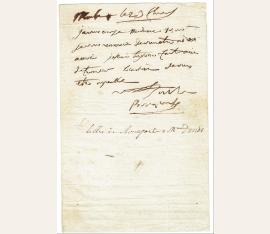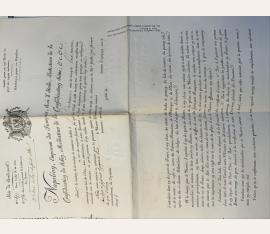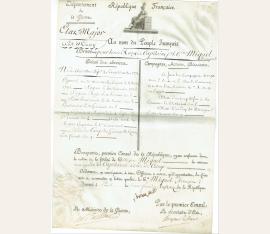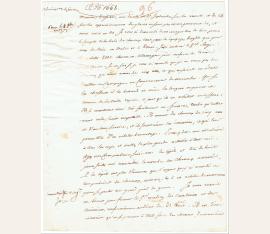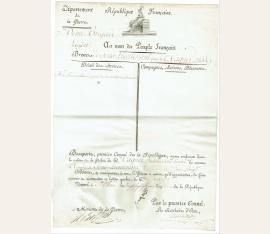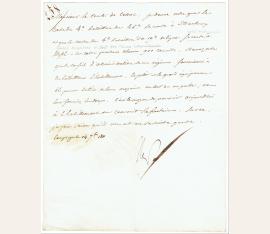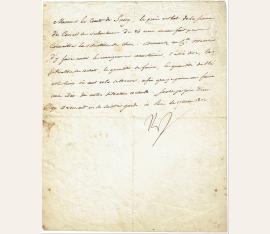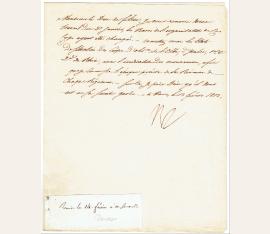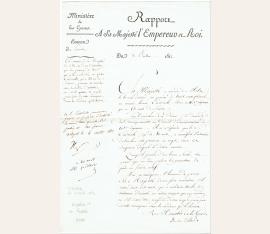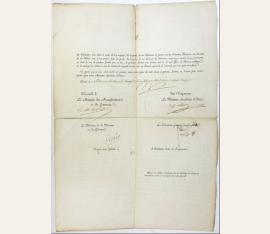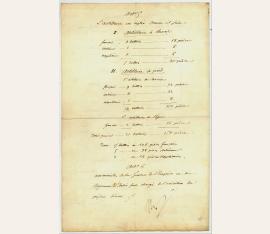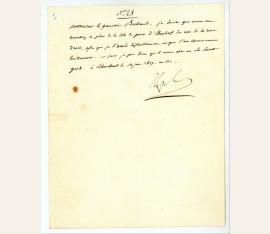Emperor of the French (1769-1821). Autograph letter signed „Bonaparte“. no place. 1/2 p. 8vo. Double sheet.
25.000 €
(92033)
Rare autograph letter signed by Napoléon: „Je vous envoye, Madame, 10,000 ff. Je vous remercie de vous être adressé à moi. Je serai toujours fort aise de trouver l'occasion de vous être agréable […]“. A later note in ink indicates that the addressee is Marie-Euphémie-Désirée de Tascher de La Pagerie (1739-1803), paternal aunt of the future Empress Joséphine. A close friend of the governor of Martinique, the Marquis François de Beauharnais. She had arranged the marriage of her niece to his youngest son, Alexandre de Beauharnais.
Emperor of the French (1769-1821). Document signed „Nap“. Palais de Saint-Cloud. Quer-Folio. 2 pp. Partly printed with an imperial arms vignette and dry seal (small slit at the intersection of the 4 folds).
5.000 €
(93460)
Maritime passport granted to a ship of the trading house 'Paul Nairac,' departing from the port of Bordeaux, 'to introduce, at its choice, into one of the ports of France, cotton, fish oils, dye woods, salted fish, and cod; coffees and sugars from French, American, and Asian colonies; cocoas, groceries of all kinds from former Dutch islands; indigos, mahogany, and cabinet woods. Countersigned by the Minister of Manufactures and Commerce: Jean-Baptiste Henry Collin, Count of Sussy; Minister Secretary of State: Duke of Cadore; Minister of the Navy and Colonies: Duke Decrès, and the Director General of Customs François Ferrier.
Emperor of the French (1769-1821). Signed document „Bonaparte“. Paris. Folio. 1 p. On parchment.
4.500 €
(93563)
Promotional document from the 'Departement de Guerre' for a Captain, dated Paris 'Trente Fructidor, an onze,' i.e., 17.9.1803. Signature 'Bonaparte' and signatures of the Minister of War and the Secretary of State, paper-covered wax seal '... Bonaparte I. Consul,' very well preserved.
Emperor of the French (1769-1821). Signed letter „Nap“. Mainz. 4to. 1 1/3 pp.
4.500 €
(93564)
Letter from Mainz, Germany to the Minister of War mentioning that he has bough 2000 horses in Germany to reinforce the artillery train. „Monsieur Dejean, my decrees of September 17 regarding the remounts and of the 24th regarding the supply of garrisons have not yet reached here, and here we are on the 30th. I asked you to send me an account of the procurement of horses every 8 days, both for the crews and for those of the train in Italy and Douai. I have authorized General Songer to purchase 2000 horses in Germany to reinforce the artillery train.
I don't know if I mentioned to you that I don't want horses that are less than 5 years old, which is a hindrance in campaigns starting in November. The hunters, hussars, and even the dragoons cannot find horses of the required size; they must buy smaller ones. They will thus show themselves easily, very easily, in France, while otherwise, it would be impossible. They will have 5-year-old horses in good condition, and they will even save money, allowing them to buy more. Write a circular to all the units and be very active in all this. Maintain correspondence with the depots, and every 8 days let me know the number of horses that have arrived. If the depots have more men than the money I have granted, they should produce 2 horses; authorize them to buy new ones to be fully prepared for war. I am sending you a decree to form the 5th squadron of carabiniers and cuirassiers in accordance with the decrees of August 31. It is therefore necessary to urgently procure horses so that the 4th squadron, which is at the depot, can join the army at the beginning of November. The fifth squadrons should be formed with men selected from officers who are on leave; there are still very good ones among them. Just be careful to appoint officers who are returning from the main army. This does not unfairly weaken it. On this, I pray to God to keep me in Mayence on September 30, 1806.“ In Napoleon's campaigns of 1805 (against Austria and Russia), 1806 (against Prussia), and 1809 (again against Austria), Mainz was the most important French assembly point..
Emperor of the French (1769-1821). Document signed „Bonaparte“. St. Cloud. Folio. 1 p. On parchment.
3.500 €
(93565)
Promotion certificate 'Departement de Guerre' for a lieutenant, dated St. Cloud '27 Floreal...' with the signature 'Bonaparte' and signatures of the Minister of War and the Secretary of State, minor tear, slight traces, very clear paper-covered wax seal '... Bonaparte I. Consul.'
Emperor of the French (1769-1821). Letter signed „Nap“. Compiègne. 4to. 3/4 p.
4.500 €
(93566)
To „Monsieur le comte de Cessac“ whom he orders to send the 4th bataillon in Strasbourg to Wesel Germany (in preparation of the Russian campaign). „Monsieur le comte de Cessac, Je donne ordre que le cadre su 4ème bataillon du 46eme se rende à Strasbourg et que le cadre du 4ème bataillon du 19ème délègue se rende à Wesel. Ces cadres prendront chacun 900 conscrits. Donnez ordre que le conflit d’administration de ces régiments fournissent aux bataillons l’habillement, le petit et le grand équipement, ils peuvent retirer de leur magasin en tout ou en partie ; nous leurs fournirons les draps.
C’est le moyen de pourvoir aujourd’hui à l’habillement du conscrit réfractaire. Sur ce je pris Dieu qu’il vous ait eu sa sainte garde.“ Translation: "Count de Cessac, I hereby order that the staff of the 4th battalion of the 46th proceed to Strasbourg and that the staff of the 4th battalion of the 19th delegate proceed to Wesel. These staffs will each take 900 conscripts. Instruct the administrative conflicts of these regiments to provide the battalions with clothing, small and large equipment; they can withdraw from their stores in whole or in part; we will provide them with sheets. This is the means of providing for the clothing of the refractory conscript today. With this, I pray to God that He has kept you in His holy care.".
Emperor of the French (1769-1821). Letter signed „Nap“. Paris. 4to. 1/2 p.
4.500 €
(93567)
Napoleon poses questions to Comte de Sussy regarding the provisioning of the troops, written six weeks before the start of the Russian campaign, likely a message already composed in anticipation. „Monsieur le comte de Sussy, le procès-verbal de la séance du conseil des subsistances du 24 mars m’a fait par connaître la situation des choses. Demandez au Commandant Masse d’y faire incérer le renseignement accoutumé, c’at à dire, la situation des achats, les quantités de farine, les quantités de blé et les lieux où tout cela se trouve, afin que je puisse me faire une idée de notre situation actuelle.
Sur ce je prie Dieu qu’il vous ait eu sa sainte garde.“ Translation: "Monsieur le comte de Sussy, the minutes of the meeting of the subsistence council on March 24 have informed me of the situation. Please ask Commander Masse to include the usual information, that is, the status of purchases, quantities of flour, quantities of wheat, and the locations where all this is stored, so that I can form an idea of our current situation. With this, I pray that God has kept you in His holy care.".
Emperor of the French (1769-1821). Letter signed „Np“. Paris. 4to. 1/2 p. Double sheet. Age toning.
3.500 €
(94207)
The letter concerns a reorganization of the troops of the Elbe, and Napoleon I entrusts the Duke of Feltre with the assembly of each regiment as well as the guard of the troops. "Monsieur le Duc de Feltre, I am returning to you your work from January 29th, as the basis of the organization of these corps has been changed. Please provide me with the status reports of the Elbe Observation Corps, Italy, 1st and 22nd of the Rhine, indicating their movements so that I may know the precise time of the assembly of each regiment? With this, I pray to God to keep you in His holy guard.“
Emperor of the French (1769-1821). Document signed „Np“. Vitebsk. Folio. 1 p.
7.500 €
(94208)
Rare document „Rapport“ from Russia, a request for a pension signed and granted by the Emperor. His Majesty granted a pension of three hundred francs to soldier Henri Endrich, a Soldier in the 103rd regiment, on May 10th last year, who has served for 53 years. For the execution of this Decree, I requested information from the Administration Council of the 103rd regiment? They responded that Soldier Endrich, aged 80, has expressed his intention to receive this pension within the unit, under the colors of which he wishes to die. Although he enjoys good health, his advanced age should no longer allow him to perform active duty. Accordingly, I have the honor to request that His Majesty inform me whether it is his wish that this soldier receives his active duty pay at the same time as his pension or if he should be discharged from his unit.
He will be granted this reward in the residence of his choice. The Minister of War Duke of Feltre Response: Soldier Endrich will be able to enjoy his active duty pay. Vitebsk, August 6, 1812..
Kaiser der Franzosen (1769-1821). Gedr. Schiffspatent mit eigenh. U. ("Np"). Le palais des Tuileries [Paris]. 25.03.1813. 490:350 mm. Blankoformular.
4.500 €
(33106/BN27891)
Schiffspatent für ein namentlich nicht genanntes amerikanisches Schiff, mitunterzeichnet von Handelsminister Jean-Baptiste Henry Collin (1776-1837), Staatssekretär Pierre Antoine Noël Bruno comte Daru (1767-1829), Marineminister Denis Decrès (1761-1820) und dem Generaldirektor der Zollverwaltung. Schönes Dokument aus der Zeit der Koalitionskriege, als Großbritannien mit seiner Armee die iberische Halbinsel besetzt hatte und gegen die napoleonischen Truppen focht und Feldmarschall Wellington kurz vor der abschließenden, schließlich für die Engländer erfolgreichen Offensive stand.
Das vorliegende Schiffspatent wurde durch den französischen Konsul in Charlestown, New York, Boston oder Baltimore ausgestellt und gestattete den amerikanischen Schiffen, sich mehr oder weniger frei auf See in Richtung Frankreich zu bewegen, wo freilich die Gefahr in Gestalt der britischen Kriegsschiffe lauerte: Diese blockierten seit Beginn der Koalitionskriege die amerikanischen Häfen an der Atlantikküste und unterbanden so den Handel Amerikas mit dem Kriegsgegner Frankreich, was im Jahr zuvor eine der Mitursachen des Britisch-Amerikanischen Kriegs gewesen war, der erst im Dezember des folgenden Jahres (1814) beigelegt werden sollte. - Mit größeren, teils hinterlegten Einrissen in den Faltungen sowie kleinen Randläsuren, sonst in gutem Zustand; am linken Rand augenscheinlich in den gedruckten Text des Gegenblatts hinein beschnitten..
Kaiser der Franzosen (1808-1873). Schriftstück mit eigenh. U. ("Np"). Kaiserliches Hauptquartier Dresden. 18.06.1813. 4 SS. auf Doppelblatt. Folio.
4.500 €
(77551/BN49996)
Das Dekret über die Aufstellung eines "Corps d'Observation d'Italie" unter dem Befehl des Prinzen Eugène Beauharnais wurde während des Waffenstillstands von Pläswitz zu Beginn der Freiheitskriege verfasst, als Napoleon den Anschluss Österreichs an die Allianz von Preußen und Russen befürchten musste, und regelt die Zusammensetzung der neu aufzustellenden Armee für die drei Waffengattungen in allen Einzelheiten. Neben französischen Verbänden werden Truppen der Königreiche Italien und Neapel bereitgestellt: Die Armee solle aus sieben Infanteriedivisionen (mit 62 französischen, 24 italienischen und 8 napoleonischen Bataillonen), drei Kavallerieregimentern (einem französischen, drei italienischen und einem neapolitanischen) und 27 Batterien reitender und Fuß-Artillerie bestehen (15 französischen, 5 italienischen und 2 neapolitanischen)..
Kaiser der Franzosen (1769-1821). Brief mit eigenh. U. Schönbrunn (Wien). 10.06.1809. ½ S. Kl.-4to.
5.500 €
(84250/BN54750)
An General Bertrand, der nach der Niederlage bei Aspern den Übergang über die Donau vorbereitete: "Je desire que vous me remettiez le plan de la tête de pont d'Ebersdorf du coté de la rive droite, afin que je l'ârrete définitivement et que l'on commence les travaux [...]". Bertrand sollte mit dem Gelingen des Plans den Sieg bei Wagram (4.-6. Juli) ermöglichen. - Mit Goldschnitt; an einer Stelle etwas fleckig und mit kleinen Heftspuren am linken Rand.

Emperor of the French (1769-1821). Autograph manuscript unsigned. Folio. 3 1/2 pp. Double sheet. Tear to vertical fold.
40.000 €
(93663)
"4 factions divided the Republic"—Napoleon reflects on the French politics of the 1790s in an important, unpublished chapter of his memoirs Unsigned handwritten manuscript by Napoleon Bonaparte, four pages on two adjoining sheets, 8 x 12.75, no date. Important, unpublished handwritten manuscript by Napoleon Bonaparte for his proposed memoirs, ostensibly penned while living in exile at Longwood House on Saint Helena. Napoleon famously dictated his memoirs to his aides, Charles Tristan, marquis de Montholon, and Emmanuel, comte de Las Cases, who had accompanied him to Saint Helena.
Las Cases published the admiring work under the title Le Mémorial de Sainte-Hélène (The Memorial of Saint Helena) in 1823. Here, Napoleon writes out lengthy commentary on the French Directory and his nation's political situation in the 1790s. In part (translated): "III. Tipping system: 4 factions divided the Republic; the 1st had confidence in the adapted constitution of 1795. The 2nd desired a president at the head of the state. The 3rd was that of the 1793 constitution, called the terrorists. The 4th, supporters of the Bourbons and counter-revolution. This last one consisted of only a few families and priests; terror had weighed on them, and they had been destroyed. Its own followers who still lived had emigrated and perished in poverty and contempt abroad. The first three factions encompassed the entire population of France. Many individuals who approved the adopted constitution had a decided aversion to the Convention delegates and would have preferred that patriots who had not participated in the government of the Convention be called to the Directory, or at least that voters not be called. The five directors had all voted for the death of the king. It was expected that they would employ all the Convention delegates, their colleagues who were no longer part of the council, and especially that they would show confidence in the voters. In the end, the directors allowed themselves to be dominated by the spirit of persecution that each had adopted during the long and tumultuous reign of the Convention, to the great astonishment of observers. One can say that the title of Convention delegate and especially that of voter became a title of exclusion from employment and soon a title of proscription. As these individuals expressed indignation at this conduct, they were, by a high police measure, expelled from Paris and obliged to return to their homes. The supporters of a president's government were easy to rally to the new system. Many of them were educated men who had figured in the Constituent Assembly, in public affairs. The director to be sidelined allied with them forever; they became, for them, the constitution that was founded on self-love but from the directors. The terrorists or supporters of the 1793 constitution were initially few in number or at least inactive; they were inclined to sincerely rally to the government composed of 5 fervent Convention delegates who had belonged to various Jacobin groups...these 5 directors were also from the party desired on the 13th Vendemiaire, and the terrorists gloried in having contributed to the success of that day. But the grandeur that surrounded the 5 directors, the title of representative, the etiquette, initially frightened them...War was soon declared; this faction went to war and soon conspired for the salvation of the fatherland and for the deliverance from the tyranny of the 5 lords of the Luxembourg...Carnot alone was one of them and enjoyed their trust. The Bourbonians hated the directors as republicans, as Convention delegates, as voters, and as the men of the 13th Vendemiaire. It was to please, to capture, and to rally this faction that the Directory worked...it was Carnot who soon became the object of the hatred and fear of all the terrorists, especially since they had hoped more from him. The armies sincerely rallied to the government, which, while retaining the principles for which they had fought, promised them more stability in their employment and more consideration. Thus, the Directory, through the strangest of illusions, worsened its position every day." On the last page is an autograph note in pencil by Charles Tristan, marquis de Montholon, a general during the Napoleonic Wars who chose to go into exile with Bonaparte on Saint Helena (translated): "Writing of Emperor Napoleon at St. Helena." In fine condition, with some light staining and soiling. Aware of the major role he had played in the history of his time, Napoleon Bonaparte devoted long hours at Saint Helena to dictate—and more rarely write—an account of his campaigns and military and political analyses of his era. Napoleon had little else to do than to reflect on his triumphs, and this piece documents some of Napoleon's own thoughts on the political situation in France during the 1790s. It is a critical manuscript that offers insight into Napoleon's understanding of his life, politics, and career..
verkauft
Brief m. e. U. "Napoleon" (aus München)
Autograph ist nicht mehr verfügbar
Napoleon I. (1769–1821), Kaiser der Franzosen. Brief mit e. U. („Napoleon“). München, 4. Januar 1806. ½ S. auf Doppelblatt. Folio. – An Kardinal Filippo Casoni (1733–1811), dem er für Glückwünsche zum Jahreswechsel dankt: „Mon Cousin, Les témoignages que votre lettre du 25 novembre contient de vos sentiments et des voeux qu’ils vous inspirent, pour moi à l’occasion du renouvellement de l’année me sont on ne peut pas plus agréables. Je goute un vrai plaisir à vous assurer de l’interêt que Je prendrai dans tous les tems à votre satisfaction [...]“. – Bayern war am 26. Dezember 1805 durch den Frieden von Preßburg Königreich geworden. – Mit dreiseitigem Goldschnitt. – Sehr schönes Blatt mit ungekürzter Unterschrift.
Eigenh. Randvermerk mit Paraphe („Np“).
Autograph ist nicht mehr verfügbar
Auf Marschall Bertrands Bericht v. 10. Februar über Reparaturen am Dach der Eisfabrik von Maricana merkt Napoleon an: „Approuvé à porter sur les dépenses imprévues“. – Wenige Tage darauf, am 26. Februar, sollte Napoleon Elba verlassen und sich auf seinen Marsch nach Paris begeben, womit die Herrschaft der Hundert Tage eröffnet war. – Mit einem kleinen Einriß am unteren linken Rand und zwei kleinen Stecknadeldurchstichen am unbeschriebenen Bl. 2. – Beiliegend vier weitere Schriftstücke betr. des Zustands und notwendiger Reparaturen an der Eisfabrik.
Brief mit eigenh. Unterschrift „NP“ an den Kriegsminister de Feltre
Autograph ist nicht mehr verfügbar
Ausführlicher Brief an den Herzog de Feltre, Henri Clarke d’Hunebourg (1765-1818). Er behandelt die in Deutschland stationierten Truppen. Der Kaiser wiederholt seine Befehle bezüglich dem Kauf von Artilleriegeschützen für die beiden Divisionen, die sich in Köln und Bonn befinden: „[…] Il est probable qu'après que j'aurai vu les deux divisions j'en enverrai une à Erfurt, et je conserverai I'autre dans le Grand Duché de Berg. - Je vous ai fait connaître ce que chaque régiment de carabiniers et de cuirassiers devait avoir, c'est à dire, un caisson d'ambulance et une forge de campagne. Les divisions doivent avoir des affaires du génie, d'artillerie, des adjoints et des administrateurs dans la proportion observée dans les campagnes précédentes [...] cela doit se faire insensiblement dans le courant de l’année. - Quant à l'artillerie, ce doit être l'objet d'un rapport particulier. Je ne puis me souvenir de ce qui s’est fait dans mes campagnes passées ; mais le plus simple et de suivre ce qui a eu lieu antérieurement. Les batteries attachées à la Cavalerie tirent beaucoup ; il faut donc qu'elles soient bien approvisionnées. J'avais dans mes campagnes passées attaché un parc de réserve aux divisions ; on sera toujours à tems de les réunir au parc général des divisions. Il faut qu'il y ait ce qui est nécessaire pour faire la guerre, c'est à dire un simple approvisionnement marchant avec les pièces, et un demi-approvisionnement, selon ce qui a été pratiqué pour l'armée de Pologne, qui soit toujours au parc de chaque division. Il faut que tout cela existe au complet dans les lieux où je ferai hiverner ces divisions, de sorte que si je suis dans le cas de former une réserve de cavalerie, la réunion de l'artillerie de réserve des quatre divisions forme le parc de réserve. Dans ce cas, un général d'artillerie sera nécessaire pour commander ce parc comme cela s'est pratiqué. Si au contraire je juge à propos d'envoyer ces divisions dans le corps d'armée, elles emmèneront leur parc d'artillerie qui se joindra au parc de réserve du corps d'armée. - I1 me semble que j'ai ordonné que chaque régiment de cuirassiers eut un certain nombre de carabines. Les régiments que j'ai passés en revue n'en ont pas. Faite- moi un rapport la dessus. Il est insensé que parmi 3000 hommes, il n'y en ait pas un qui ait une arme à feu. Il me semble qu'autrefois les cuirassiers étaient armés de mousquetons. Faite- moi connaitre les ordres que j'ai donnés et ce qui s'est pratiqué depuis six ans, et pourquoi les cuirassiers n'ont plus aujourd’hui de carabine […]“ Napoleon äußert seine Absicht, nach Inspektion der beiden Truppen, eine davon nach Erfurt zu schicken und eine im Großherzogtum Berg zu behalten. Gran-Duché de Berg et de Clèves war ein von 1806 bis 1813 bestehender napoleonischer Satellitenstaat mit Hauptstadt Düsseldorf. Napoleon erwähnt die Ausstattung, über die jedes Regiment zu verfügen habe, darunter einen Krankentransport und eine Feldschmiede. Zudem lässt sich der Kaiser über die personelle Zusammensetzung der Regimenter aus. Der Artillerie weist er besondere Bedeutung zu, sie müsse Gegenstand eines Sonderberichts sein. Dabei solle das angewandt werden, was sich in der Vergangenheit bewährt habe. Napoleon geht dabei ins Detail. So spricht er an, dass die Geschütze der Kavallerie oft abgefeuert würden und deshalb besonders gepflegt werden müssten. Er erklärt, was für die Versorgung während eines Krieges besonders wichtig ist: eine einfache Versorgung der Truppen nach dem Vorbild der polnischen Truppen. Napoleon geht es darum, dass die Divisionen alle von ihm aufgeführten Maßnahmen an ihren Überwinterungslagern erhalten, damit er - wann immer er möchte - die gut ausgestatteten Truppen zusammenziehen kann. Für die Organisation sei ein général d’artillerie von Nöten. Gegen Ende des Briefs kritisiert Napoléon, dass seine Anweisungen, dass jedes jedes Kürassierregiment eine bestimmte Anzahl von Karabinern haben sollte, nicht befolgt wurden. Er habe dies überprüft. Der Herzog solle darüber Meldung erstatten, denn es sei „verrückt“, dass keiner der 3000 Männer über eine Waffe verfüge. Die Kürassiere seien doch früher bewaffnet gewesen. Dann wird er konkret: „Lassen Sie mich wissen, wie meine Befehle lauteten, was in den letzten sechs Jahren getan wurde und warum die Kürassiere keine Gewehre mehr haben.“ Der Adressat, Henri-Jacques-Guillaume Clarke, comte d’Hunebourg, duc de Feltre, war ein französischer General. Im Feldzug gegen Österreich 1805 wurde er Gouverneur von Wien, 1806 Gouverneur in Erfurt, dann in Berlin. 1807 kehrte er nach Paris zurück und wurde Kriegsminister. Er verwaltete dieses schwierige Amt mit großem Geschick und seltener Uneigennützigkeit, aber auch mit rücksichtsloser Strenge. Später, bei Napoleons Sturz, spielte er eine unrühmliche Rolle. Er stimmte für die Absetzung des Kaisers und wurde dafür von Ludwig XVIII. zum Pair ernannt.
2 Randvermerke m. e. U.
Autograph ist nicht mehr verfügbar
Napoleon I. (1769-1821), Kaiser von Frankreich. 2 Randvermerke (der zweite eigenh.) m. U. „Np“ auf einem an ihn gerichteten Schriftstück des Generals Drouot, Porto Ferraio, 12. Juli 1814, mit einer Nachschrift des Marschalls Bertrand vom 17. Juli 1814, 1 Seite Folio. Etwas beschnitten. Auf dem Bericht des Generals Drouot wegen des hohen Preises, den der Kaufmann Foresi für eine „ration de fourages“ fordere, die Anweisung des Kaisers: „Renvoyé au Grand Maréchal“. Darunter der Bericht des Grand Maréchal Bertrand, der eine Preisminderung vorschlägt. – Am Rand der Genehmigungsvermerk des Kaisers: „app[rouvé] Np“.
